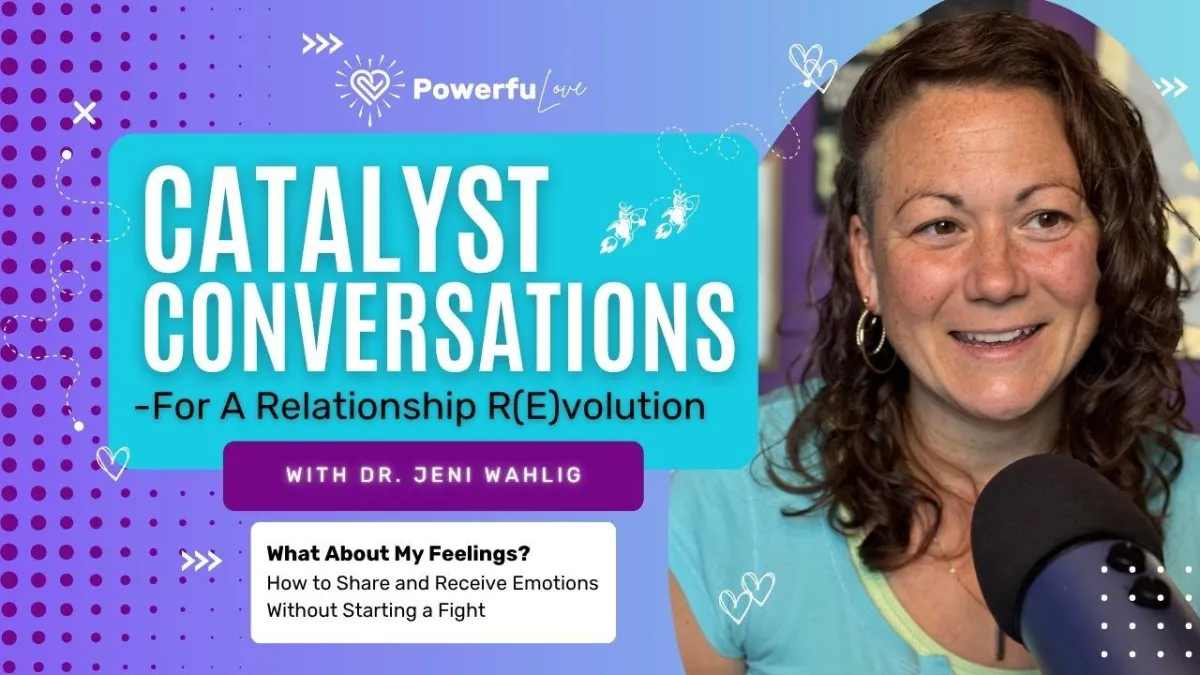
How to Share Feelings Without Starting a Fight
What About My Feelings? How to Share and Receive Emotions Without Starting a Fight

Why Your Feelings (and Theirs) Deserve to Be Heard
Ever tried to share your feelings with your partner… only to have them get defensive, flip it back on you, or shut down completely?
It’s frustrating. It’s lonely.
And it can leave you wondering: Do they even care about me at all?
At the heart of every strong relationship is one universal desire: to feel cared about, understood, and validated. But in too many relationships, conversations about feelings turn into arguments, misunderstandings, or silent stand‑offs.
In this guide, I’ll share the exact tools I teach in my PowerfuLove method for sharing and receiving feelings in a way that deepens connection instead of damaging it—even if you and your partner have been stuck in a cycle of defensiveness for years.
The Real Reason Your Partner Gets Defensive
Before we talk about solutions, let’s get clear on why your partner might react with defensiveness, justification, or withdrawal when you bring up your feelings.
When someone hears that they’ve hurt you (intentionally or not), it often triggers:
Shame – “I must be a bad partner.”
Fear – “Am I failing in this relationship?”
Anxiety – “I don’t know how to fix this.”
Guilt – “I didn’t mean to hurt you.”
The nervous system goes into self‑protection mode, which often looks like:
Arguing their point
Turning the focus back on their own feelings
Shutting down emotionally
Understanding this doesn’t excuse hurtful reactions—but it gives you insight into what’s going on beneath the surface so you can set up your conversations for success.
4 Ways to Share Your Feelings So Your Partner Can Actually Hear You
1. Get Consent First
Don’t spring an emotionally charged conversation on your partner.
Instead, ask:
“I have something important to share about how I’ve been feeling. Is now a good time?”
If they’re not ready, agree on a specific time to talk.
2. Acknowledge Their Good Intentions
Start from a place of compassion. For example:
“I know you’d never want to hurt me, and I appreciate that you’re willing to hear me out.”
This softens defensiveness and signals that you see the good in them, even when you’re upset.
3. Make a Clear Request
Before diving in, tell them exactly how they can support you:
“What I need most right now is for you to just listen and try to understand—without jumping in with your side yet.”
4. Let Their Efforts Count
They may not respond perfectly at first. Celebrate progress instead of expecting perfection. This encouragement builds a safer environment for future conversations.
How to Receive Your Partner’s Feelings Without Losing Your Cool
If you tend to be on the receiving end of big emotions, here’s how to respond without making things worse—and open the door for your own feelings to be heard later.
1. Their Feelings Are Not an Attack
Even if they come out messy, feelings are often a bid for connection—not a character assassination.
2. Care About Theirs First
The fastest way to have your feelings cared for? Care for theirs first. Emotional safety flows both ways.
3. Whoever Brings It Up First Gets to Go First
If they initiated the conversation, let them finish before sharing your perspective. You’ll get your turn.
4. Validation ≠ Agreement
You can validate your partner’s experience (“That makes sense given what you’ve shared”) without agreeing with their interpretation.
5. Don’t Expect Perfect Delivery
Ask for respectful tone and boundaries, but accept that emotional conversations aren’t going to sound like a TED Talk.
The Relationship Superpower You Can Build Together
When you and your partner learn how to share and receive feelings without spiraling into defensiveness, you unlock one of the most powerful relationship skills there is.
This isn’t just about communication—it’s about creating an unbreakable emotional bond. One where you know that, even in hard moments, you can count on each other to show up with care, concern, compassion, and love.
Ready to Practice This in Real Life?
This skill takes practice—and it’s exactly what we do every month inside The Relationship (R)Evolution membership.
For just $97/month, you’ll get:
Live monthly Q&A with me, Dr. Jeni Wahlig
Weekly integration prompts to turn insights into action
A supportive community of couples and individuals learning these exact tools
Join us today and start transforming the way you and your partner connect:
👉 Join The Relationship (R)Evolution